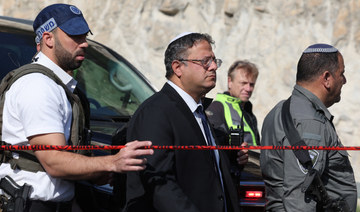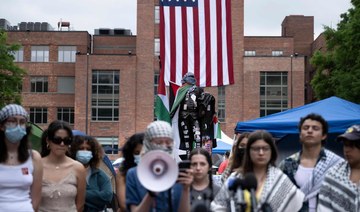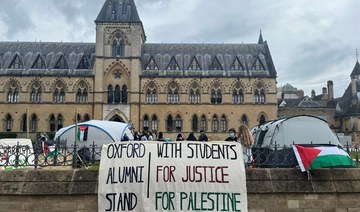A school district in southwest Missouri decided to bring back spanking as a form of discipline for students — if their parents agree — despite warnings from many public health experts that the practice is detrimental to students.
Classes resumed Tuesday in the Cassville School District district for the first time since the school board in June approved bringing corporal punishment back to the 1,900-student district about 60 miles (100 kilometers) southwest of Springfield. The district had dropped the practice in 2001.
The policy states that corporal punishment will be used only when other forms of discipline, such as suspensions, have failed and then only with the superintendent's permission.
Superintendent Merlyn Johnson told The Springfield News-Leader the decision came after an anonymous survey found that parents, students and school employees were concerned about student behavior and discipline.
“We’ve had people actually thank us for it,” he said. “Surprisingly, those on social media would probably be appalled to hear us say these things, but the majority of people that I’ve run into have been supportive.”
Parent Khristina Harkey told The Associated Press on Friday that she is on the fence about Cassville's policy. She and her husband did not opt-in because her 6-year-old son, Anakin Modine, is autistic and would hit back if he were spanked. But she said corporal punishment worked for her when she was a “troublemaker” during her school years in California.
“There are all different types of kids,” Harkey said. “Some people need a good butt-whipping. I was one of them."
Morgan Craven, national director of policy, advocacy and community engagement with the Intercultural Development Research Association, a national educational equity nonprofit, called corporal punishment a "wildly inappropriate, ineffective practice."
The U.S. Supreme Court ruled in 1977 that corporal punishment is constitutional and left it up to states to set their own policies. Craven said 19 states, many in the South, have laws allowing it in schools. The most current data from 2017-18 shows about 70,000 children in the U.S. were hit at least once in their schools.
Students who are hit at school do not fare as well academically as their peers and suffer physical and psychological trauma, Craven said. In some cases, children are hurt so badly that they need medical attention.
“If you have a situation where a kid goes to school and they could be slapped for, you know, some minor offense, it certainly creates a really hostile, unpredictable and violent environment," Craven said. “And that’s not what we want for kids in schools.”
But Tess Walters, 54, the guardian of her 8-year-old granddaughter, had no qualms about signing the corporal punishment opt-in papers. She said the possibility of being spanked is a deterrent for her granddaughter, who has attention-deficit/hyperactivity disorder.
“I’ve read some some people’s responses on Facebook recently, and they’re just going over the top like, ‘Oh, this is abuse, and, oh, you’re just going to threaten them with, you know, violence.’ And I’m like, ‘What? The child is getting spanked once; it’s not beatings.’ People are just going crazy. They’re just being ridiculous,” Walters said.
Mitch Prinstein, chief science officer with American Psychological Association, said decades of research shows corporal punishment will not reduce inappropriate behavior and is likely to increase aggression, rage, hostility and could lead to depression and self-esteem problems.
Prinstein said better methods for eliminating undesirable conduct including problem-solving training; rewarding positive behavior, such as with extra recess; and providing extra attention in the classroom.
“Parents are experts on what works for their own children,” Prinstein said. “But it’s important for parents to be educated on very substantial science literature demonstrating again that corporal punishment is not a consistently effective way of changing undesirable behavior.”
Sarah Font, an associate professor of sociology and public policy at Pennsylvania State University, coauthored a 2016 study on the subject. Her research found that districts using corporal punishment are generally in poor, Republican-leaning rural areas in Southern states. Font said Black children are disproportionately subjected to it, in part because the policies are more commonplace in districts with higher minority populations.
Craven also pointed to racial bias that leads people to view the behavior of Black students differently from other students.
“And the thing that I always have to say — that I hate that I have to say — is that Black children are not more likely to misbehave in school. They’re not more likely to break school rules,” she said.
Cassville School District spokeswoman Mindi Artherton was out of the office Friday and a woman who answered the phone in her office suggested reading the policy. She said staff had already done interviews. “At this time, we will focus on educating our students,” she added, before hanging up.
The policy says a witness from the district must be present and that the discipline will not be used in front of other students.
“When it becomes necessary to use corporal punishment, it shall be administered so that there can be no chance of bodily injury or harm,” the policy says. “Striking a student on the head or face is not permitted.”
In Missouri, periodic efforts to ban corporal punishment in schools have failed to gain traction in the Legislature. The state does not track which districts allow spanking because those decisions are made at the local level, a spokeswoman for Missouri’s K-12 education department said.
U.S. Sen. Christopher Murphy, a Connecticut Democrat, is pushing for a ban on the use of corporal punishment in schools that receive federal funding. He has called it a “barbaric practice” that allows teachers and administrators to physically abuse students.
US school district reinstates spanking if parents OK
https://arab.news/wnsds
US school district reinstates spanking if parents OK

Biden makes new outreach to Black voters as support slips

WASHINGTON: US President Joe Biden is trying to shore up his support among vital Black voters with a days-long series of events starting Thursday, including a visit to the former university of civil rights icon Martin Luther King.
Democrat Biden relied on African-American voters to help him beat Donald Trump in 2020, but some polls show they are increasingly deserting him ahead of November’s rematch with the Republican.
On Thursday Biden, 81, marked the 70th anniversary of a famous US Supreme Court ruling that overturned racial segregation in schools by meeting with key figures in the case in the Oval Office.
They included Adrienne Jennings Bennett, one of the plaintiffs in the 1954 Brown v. Board of Education case that proved a milestone for the US civil rights movement, and Cheryl Brown Henderson, a daughter of plaintiff Oliver Brown.
Biden “recognized that back in the 40s and 50s ... the folks that you see here were taking a risk when they signed up to be part of this case,” Henderson said after the meeting.
On Friday Biden visits the Smithsonian’s National Museum of African American History and Culture in Washington to give remarks to celebrate the anniversary of the Brown decision.
Later on Friday Biden and Vice President Kamala Harris — the first Black, South Asian and female “veep” in US history — will meet leaders from nine historically Black sororities and fraternities.
Biden is honoring “the legacy of those who paved the way for progress and hard-fought rights for Black Americans,” said White House Press Secretary Karine Jean-Pierre.
“He will also highlight his vision for how we must continue to build on these freedoms,” added Jean-Pierre, who is the first Black person to serve in the role.
Then on Sunday Biden will address students at the historically Black Morehouse College in Atlanta, Georgia, whose most famous former student is civil rights leader King.
Biden has a bust of King in the Oval Office in a sign of his support for racial equality, which he frequently contrasts with what he says is racially insensitive and anti-immigrant language by his rival Trump.
His visit to Morehouse is politically sensitive, however, as US campuses and graduation ceremonies have recently been disrupted by widespread protests against Biden’s support for Israel’s war in Gaza.
A senior White House official recently met students and faculty members at Morehouse to discuss objections to Biden delivering the commencement address, NBC News reported.
Biden’s outreach to Black voters comes days after a New York Times/Siena poll showed that in addition to trailing Trump in several key battleground states, he is also losing ground with African Americans.
Trump is winning more than 20 percent of Black voters in the poll — which would be the highest level of Black support for a Republican presidential candidate since the Civil Rights Act was enacted in 1964, The New York Times said.
Several other polls have also shown Biden’s support lagging among Black voters.
But a participant in Thursday’s White House gathering, Derrick Johnson, president of the country’s major civil rights organization NAACP, disputed the narrative that there has been “an erosion” of support among Black voters, and said polls have been wrong in several recent elections.
“I hope that the American public recognizes in order for us to remain a leading democracy we must participate at the highest level,” he said.
In 2020, Black voters were overwhelmingly loyal to the Democratic Party, with 92 percent voting for Biden and only eight percent for Trump, according to the Pew Research Center.
Canada sanctions four Israelis over ‘extremist’ settler violence in West Bank

- The sanctions target individuals accused of engaging in violent acts against Palestinian civilians
OTTAWA: Canada on Thursday imposed sanctions on four Israeli individuals accused of violence against Palestinians in the West Bank, joining allies including the United States and Britain in attempting to deter growing settler violence.
The sanctions, Canada’s first against what the foreign ministry described as “extremist Israeli settlers,” target individuals accused of engaging directly or indirectly in violence and violent acts against Palestinian civilians and their property.
Mic cuts out as graduating student tells Columbia to act over Gaza

- Saham David Ahmed Ali demanded the college call for a ceasefire in the war-torn enclave, reveal its business dealings with companies linked to Israel
- Microphone cut out mid-speech, leading to fellow graduates booing and chanting ‘let her speak’
- Columbia has witnessed serious protests in recent weeks, with hundreds of students arrested
LONDON: A microphone briefly cut out this week during a speech given at a graduation ceremony at Columbia University in the US, during which the speaker criticized the university’s stance on Gaza.
On Tuesday, student Saham David Ahmed Ali was giving a speech to graduates at the Mailman School of Public Health, in which she called for action against Israel and criticized the “silence on Columbia University’s campus.”
The microphone began to cut out during her speech, leading to students booing and chanting “let her speak” as Ali paused. She was later able to continue. It is unclear if the issue was caused by a technical fault or if the microphone was muted deliberately.
Ali said the university needed to reveal its dealings with companies “profiting off of Palestinian genocide” and that it should immediately divest from them.
She also demanded Columbia call for an immediate ceasefire in Gaza, where Palestinian civilians currently face famine, according to the UN, as Israel continues its military campaign that has left over 35,000 people dead, many thousands more wounded, and hundreds of thousands displaced following the attack by Hamas on Israel on Oct. 7.
Columbia has witnessed significant protests across its campus since April 17 after the university’s president, Minouche Shafik, testified before the US Congress about alleged incidents of antisemitism against Jewish students on its grounds.
Protestors have subsequently occupied parts of the campus including the university’s Hamilton Hall. The New York Police Department has arrested hundreds of people over the protests, which have also sparked similar movements at other major US colleges, as well as counter-demonstrations by students with Israeli and US flags.
Columbia has also taken the unusual step of canceling its commencement ceremony this year in the wake of the protests, only holding school-specific graduation ceremonies.
Defense team says 9 Egyptians accused of causing deadly shipwreck misidentified as crew

- Adriana, an overcrowded fishing trawler, sank on June 14 off southeastern coast of Greece
- Only 104 survived out of 500-700 Pakistanis, Egyptians, Syrians and Palestinians aboard ship
ATHENS, Greece: The legal defense team for nine Egyptian men due to go on trial in southern Greece next week accused of causing one of the Mediterranean’s deadliest shipwrecks said Thursday they will argue that Greece has no jurisdiction in the case, and insisted their clients were innocent survivors who have been unjustly prosecuted.
The nine, whose ages range from early 20s to early 40s, are due to go on trial in the southern city of Kalamata on May 21 on a series of charges, including migrant smuggling, participation in a criminal organization and causing a deadly shipwreck. They face multiple life sentences if convicted.
The Adriana, an overcrowded fishing trawler, had been sailing from Libya to Italy with hundreds of asylum-seekers on board when it sank on June 14 in international waters off the southwestern coast of Greece.
The exact number of people on board has never been established, but estimates range from around 500 to more than 700. Only 104 people survived — all men and boys from Syria, Egypt, Pakistan and two Palestinians — and about 80 bodies were recovered.
The vessel sank in one of the Mediterranean’s deepest areas, making recovery efforts all but impossible.
The Greek lawyers who make up the defense team spoke during a news conference in Athens on Thursday. They maintained their clients’ innocence, saying all nine defendants had been paying passengers who had been misidentified as crew members by other survivors who gave testimonies under duress just hours after having been rescued.
The nine “are random people, smuggled people who paid the same amounts as all the others to take this trip to Italy aiming for a better life, and they are accused of being part of the smuggling team,” lawyer and defense team member Vicky Aggelidou said.
Dimitris Choulis, another lawyer and member of the legal team, said that Greek authorities named the defendants as crew members following testimonies by nine other survivors who identified them for having done things as simple as handing bottles of water or pieces of fruit to other passengers.
“For nearly a year now, nine people have been in prison without knowing what they are in prison for,” Choulis said.
“For me, it is very sad to visit and see people in prison who do not understand why they are there,” he added.
While the Adriana was sailing in international waters, the area was within Greece’s search and rescue zone of responsibility. Greece’s coast guard had been shadowing the vessel for a full day without attempting a rescue of those on board. A patrol boat and at least two merchant ships were in the vicinity when the trawler capsized and sank.
In the aftermath of the sinking, some survivors said the coast guard had been attempting to tow the boat when it sank, and rights activists have accused Greek authorities of triggering the shipwreck while attempting to tow the boat out of Greece’s zone of responsibility.
Greek authorities have rejected accusations of triggering the shipwreck and have insisted the trawler’s crew members had refused to accept help from the nearby merchant ships and from the Greek coast guard.
A separate investigation being carried out by Greece’s naval court hasn’t yet reached any conclusion, and the defense team hasn’t been given any access to any part of it.
The Egyptians’ defense team also argues that because the shipwreck occurred in international waters, Greek courts don’t have jurisdiction to try the case, and the defense will move to have the case dismissed on those grounds when the trial opens in Kalamata next week.
Greece lies along one of the most popular routes into the European Union for people fleeing war and poverty in the Middle East, Africa and Asia. While most of those cross into the country’s eastern Aegean Sea islands from the nearby Turkish coast, others try to skirt Greece altogether and head from north Africa to Italy across the longer and more dangerous Mediterranean route.
On Thursday, Greece’s coast guard said that 42 people had been rescued and another three were believed to be missing after a boat carrying migrants sent out a distress call while sailing south of the Greek island of Crete.
Officials said they were alerted by the Italian coast guard overnight about a boat in distress 27 nautical miles (31 miles or 50 kilometers) south of Crete. Greece’s coast guard said that 40 people were rescued by nearby ships, and another two were rescued by a Greek navy helicopter.
A search and rescue operation was underway for three people reported by survivors as still missing. It wasn’t immediately clear what kind of vessel the passengers had been on, or why the boat sent out a distress call.
Police dismantle pro-Palestinian encampment at DePaul University in Chicago

- All of the protesters at the encampment “voluntarily left” the area when police arrived early Thursday
- The move to clear the campus comes less than a week after the school’s president said public safety was at risk
CHICAGO: Police began dismantling a pro-Palestinian encampment early Thursday at DePaul University in Chicago, hours after the school’s president told students to leave the area or face arrest.
Officers and workers in yellow vests cleared out tents and camping equipment at the student encampment, leaving behind yellow squares of dead or dying grass where the tents had stood. Front-loaders were being used to remove the camping equipment.
Just across the street from where the encampment was spread across a grassy expanse of DePaul’s campus known as “The Quad,” a few dozen protesters stood along a sidewalk in front of a service station, clapping their hands in unison as an apparent protest leader paced back and forth before them, speaking into a bullhorn.
All of the protesters at the encampment “voluntarily left” the area when police arrived early Thursday, said Jon Hein, chief of patrol for the Chicago Police Department.
“There were no confrontations and there was no resistance,” he said at a news briefing. “As we approached, all the subjects voluntarily left the area.”
Hein said, however, that two people, a male and female in their 20s, were arrested outside the encampment “for obstruction of traffic.”
The move to clear the campus comes less than a week after the school’s president said public safety was at risk.
The university on Saturday said it had reached an “impasse” with the school’s protesters, leaving the future of their encampment on the Chicago campus unclear. Most of DePaul’s commencement ceremonies will be held the June 15-16 weekend.
In a statement then, DePaul President Robert Manuel and Provost Salma Ghanem said they believe that students intended to protest peacefully, but “the responses to the encampment have inadvertently created public safety issues that put our community at risk.”
Efforts to resolve the differences with DePaul Divestment Coalition over the past 17 days were unsuccessful, Manuel said in a statement sent to students, faculty and staff Thursday morning.
“Our Office of Public Safety and Chicago Police are now disassembling the encampment,” he said. “Every person currently in the encampment will be given the opportunity to leave peacefully and without being arrested.”
He said that since the encampment began, “the situation has steadily escalated with physical altercations, credible threats of violence from people not associated with our community.”
Students at many college campuses this spring set up similar encampments, calling for their schools to cut ties with Israel and businesses that support it, to protest lsrael’s actions in the war with Hamas. The protests began as schools were winding up their spring semesters and are now holding graduation ceremonies.
Separately, some students and faculty were detained Wednesday after police removed an encampment and pro-Palestinian protesters briefly took over a lecture hall at the University of California, Irvine. There was a large law enforcement response when demonstrators demanding the university divest from Israel blocked the building’s entrance with a makeshift barricade. Police declared an unlawful assembly, cleared the building and took an unknown number of people into custody.
Also Wednesday, 11 members of a group protesting at the University of Tennessee in Knoxville who did not vacate the area despite repeated warnings were arrested for trespassing, the university said in a statement. Those arrested included three students and eight people who are not affiliated with the university. Any students who were arrested will also be referred to student conduct, officials said.
“The University of Tennessee respects individual’s rights to free speech and free expression and is committed to managing the campus for all,” the university said in the statement. “We will continue to be guided by the law and university policy, neutral of viewpoint.”
Tensions at DePaul flared the previous weekend when counterprotesters showed up to the campus in the city’s Lincoln Park neighborhood and prompted Chicago police to intervene.
The student-led DePaul Divestment Coalition, who are calling on the university to divest from Israel, set up the encampment April 30. The group alleged university officials walked away from talks and tried to force students into signing an agreement, according to a student statement late Saturday.
“I don’t want my tuition money to be invested in my family’s suffering,” Henna Ayesh, a Palestinian student at DePaul and Coalition member, said in the statement.
DePaul is on the city’s North Side. Last week, police removed a similar encampment at the University of Chicago on the city’s South Side.
The Associated Press has recorded at least 79 incidents since April 18 where arrests were made at campus protests across the US More than 2,900 people have been arrested on the campuses of 60 colleges and universities. The figures are based on AP reporting and statements from universities and law enforcement agencies.
















